Strange Case Of Dr. Jekyll and Mr. Hyde by Robert Louis Stevenson (1886)
O God!’ I screamed, and ‘O God!’ again and again; for there before my eyes–pale and shaken, and half fainting, and groping before him with his hands, like a man restored from death – there stood Henry Jekyll!
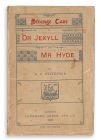
In an ideal world a person should know nothing about this book and come to it fresh, but it is far too late for most people, such is the fame of the story. If you want a quick, thrilling gothic read you can have that. Alternatively you can read it more carefully (or reread it) and extract any number of fascinating subtexts and dream up your own interpretations; and that is exactly what I have done.
I’m cataloguing this story under the category: “Mad scientists” (part of a series), but I could equally have placed it under:
Criminal psychology
Allegories
Gothic novels
Evolution
Masculinity
Sexuality
Victorian society
Christian theology
– etc.
My last review was a book discussing mystery and detective fiction. And arguably Dr Jekyll and Mr Hyde would not be out of place within that genre either. It’s a story with an atmospheric setting (foggy Victorian London), a murder, an investigation both by the official police and by amateur investigators – and in the end we get a shocking solution. The clues are presented to us and if we didn’t guess the ending correctly, then perhaps we weren’t paying attention.
Spoiler alert!
The problem for the reader is that hardly anyone will read this novella without knowing the ending. That nice Doctor Jekyll, who likes to do amateur science experiments in his basement, is also that horrible Mr Hyde with a hygiene problem and a taste for murder; two names one person. The names have even entered the English language: “My boss has a Jekyll and Hyde personality!”. So the pleasure the modern reader must take is different from that of the late Victorians; we already know the ending, and we must instead enjoy the ride.
The story begins when we learn that friends and colleagues of a rich and respectable man of 50, Dr. Henry Jekyll, are concerned that he is protecting a mysterious and vicious young man of dubious appearance, Mr. Edward Hyde. Hyde has been granted free access to Jekyll’s house, and the servants have been commanded to obey his every order. Even worse, Dr. Jekyll’s lawyer is horrified that his friend has made Hyde (almost) the sole beneficiary of his large estate.
.. in case of the decease of Henry Jekyll, M.D., D.C.L., L.L.D., F.R.S., etc., all his possessions were to pass into the hands of his “friend and benefactor Edward Hyde,” but that in case of Dr. Jekyll’s “disappearance or unexplained absence for any period exceeding three calendar months,” the said Edward Hyde should step into the said Henry Jekyll’s shoes without further delay.
At this point what would Jekyll’s close friends (and many Victorian readers) have made of this? Victorian novels commonly contained “issues of the day”. This is purely speculation but, as it happens, Dr Jekyll and Mr Hyde was written in the same year that saw the passage of the famous/notorious Criminal Law Amendment Act, 1885, creating the offence of ‘gross indecency’ (sometimes referred to as the “Blackmailers’ Charter”). This was the legislation used to send Oscar Wilde to prison in 1895. Given that context it, perhaps, puts a different perspective on some of Jekyll’s lawyer friend’s comments in the story:
“I thought it was madness,” he said, as he replaced the obnoxious paper [the will] in the safe, “and now I begin to fear it is disgrace.”
And:
It turns me cold to think of this creature stealing like a thief to Harry’s bedside
And:
Black mail I suppose; an honest man paying through the nose for some of the capers of his youth.
Later on the lawyer receives a letter from Hyde:
The lawyer liked this letter well enough; it put a better colour on the intimacy than he had looked for; and he blamed himself for some of his past suspicions.
But perhaps I am reading into the text something that is not there. All too easy for a reviewer to do. When I first read the story I thought Stevenson might have been influenced by the “Jack the Ripper” murders (they didn’t happen until 2 years after Dr Jekyll and Mr Hyde was published) and I could even read into the story the influence of Sigmund Freud. By coincidence Freud set up his practice in the same year that the book was published (1886), but this was a few years prior to the development of his psychoanalytic theory. So Freud surely had no influence on Stevenson’s writing. However it is likely that Freud did influence many later readers interpretation of Dr Jekyll and Mr Hyde. Read the passage below and then tell me that Freud doesn’t come briefly into your mind.
I thus drew steadily nearer to that truth, by whose partial discovery I have been doomed to such a dreadful shipwreck: that man is not truly one, but truly two. I say two, because the state of my own knowledge does not pass beyond that point. Others will follow, others will outstrip me on the same lines … I saw that, of the two natures that contended in the field of my consciousness, even if I could rightly be said to be either, it was only because I was radically both … It was the curse of mankind that these incongruous faggots were thus bound together—that in the agonised womb of consciousness, these polar twins should be continuously struggling.
Arguably, the connection between Stevenson’s, Dr Jekyll and Freud’s psychoanalytic theory is evolutionary theory. 15 years prior to the publication of Jekyll and Hyde, Charles Darwin published The Descent of Man (1871). In this work Darwin applied evolutionary theory to human evolution and discussed the relevance of evolution to society. But for our purposes it is not so important what Darwin actually said, but rather what most Victorians assumed he said, including that modern man had evolved from a more primitive, wild, brutish form. We humans have a tendancy to put new knowledge into our old bottles.
God bless me, the man seems hardly human! Something troglodytic, shall we say?
In Dr Jekyll and Mr Hyde the concept of duality is introduced, modern man and primitive man living within one person.
I learned to recognise the thorough and primitive duality of man; I saw that, of the two natures that contended in the field of my consciousness, even if I could rightly be said to be either, it was only because I was radically both
To many Victorian readers the character of Dr Jekyll represented civilised modern man – educated, sensitive, mature, capable of deferred gratification, empathy, philanthropy. The character of Hyde was what man once was – rude, animalistic, ignorant, violent, uncivilised, instinctive, dangerous, a savage, childlike. Hyde has no patience or self control, no boundaries.
And then all of a sudden he [Hyde] broke out in a great flame of anger, stamping with his foot, brandishing the cane, and carrying on (as the maid described it) like a madman. The old gentleman took a step back, with the air of one very much surprised and a trifle hurt; and at that Mr. Hyde broke out of all bounds and clubbed him to the earth. And next moment, with ape-like fury, he was trampling his victim under foot and hailing down a storm of blows, under which the bones were audibly shattered and the body jumped upon the roadway. [The murder of Sir Danvers Carew, MP]
Two natures in one man. Yet by the end of the story, when the potion is gone, it seems Hyde’s primitive nature has come to dominate the advanced nature of Jekyll. A Victorian nightmare!
… it had seemed to me of late as though the body of Edward Hyde had grown in stature, as though (when I wore that form) I were conscious of a more generous tide of blood; and I began to spy a danger that, if this were much prolonged, the balance of my nature might be permanently overthrown, the power of voluntary change be forfeited, and the character of Edward Hyde become irrevocably mine.
It is difficult to be sure exactly what was in Stevenson’s mind when he wrote Dr Jekyll and Mr Hyde, there are so many different accounts of the writing process – including that the original version had been destroyed and it had to be re-written over a period of 3 days in a fever (with or without cocaine).
Much of the success of the story may be that it was possible for the reader to make of it what they wished, it was a hook on which to hang any number of theories or accommodate any number of fears. One was the possibility that evolution could be reversed, i.e. devolution – or at least that degeneration was feasible. Another was that we humans have only a veneer of civilisation on top of millions of years of savagery – our true natures threatening to return when our guard is down.
Reading Dr Jekyll and Mr Hyde I regularly noticed references to facades, deception, fakery – or battles with our hidden nature. This could have been a long list, but I shall refer to just a few.
Jekyll is a rich man with a fine house, and presumably a handsome front door that respectable people use.
One house, however, second from the corner, was still occupied entire; and at the door of this, which wore a great air of wealth and comfort …
But much of the action in the story takes place at the rear of the house (and via the laboratory door) – and that has a completely different character.
… at that point a certain sinister block of building thrust forward its gable on the street. It was two storeys high; showed no window, nothing but a door on the lower storey and a blind forehead of discoloured wall on the upper; and bore in every feature, the marks of prolonged and sordid negligence. The door, which was equipped with neither bell nor knocker, was blistered and distained. Tramps slouched into the recess and struck matches on the panels; children kept shop upon the steps; the schoolboy had tried his knife on the mouldings; and for close on a generation, no one had appeared to drive away these random visitors or to repair their ravages.
Such language. ‘Sinister’ – ‘discoloured’ – ‘sordid negligence’ – ‘blistered’ – ‘distained’ – ‘tramps’ – ‘slouched’ – ‘recess’ – a delinquent schoolboy chipping away at the house with a knife – ‘ravages’. All that in one paragraph at the beginning of the story. The reader is being told something important right at the start; all is not what it appears to be.
And what are we to make of Dr Jekyll’s friends, Enfield and Utterson? Their philosophy of life appears to be to never challenge another person for fear of what might be revealed:
“I incline to Cain’s heresy,” he used to say quaintly: “I let my brother go to the devil in his own way.”
[“And the LORD said unto Cain, Where is Abel thy brother? And he said, I know not: Am I my brother’s keeper?” Genesis 4:9, King James Version]
Incidently, this Cain reference in the first paragraph of Dr. Jekyll is quite telling. In the biblical story, Cain killed his brother Abel. The ending of Dr. Jekyll is slightly obscure, but it appears Jekyll takes his own life (rather than become Hyde forever) and thereby kills Hyde.
And:
No sir, I make it a rule of mine: the more it looks like Queer Street, the less I ask.”
“A very good rule, too,” said the lawyer.
Then there is the scene where the lawyer is caught lying to Hyde:
“He never told you,” cried Mr. Hyde, with a flush of anger. “I did not think you would have lied.”
“Come,” said Mr. Utterson, “that is not fitting language.”
More deceit, and etiquette that demands the deceit isn’t mentioned.
And what about Hyde’s maid/housekeeper?
She had an evil face, smoothed by hypocrisy; but her manners were excellent.
Again – surface concealing something more sinister.
And lastly, there is the name of Hyde himself (hide, things hidden). Jekyll names the other side of his personality “Hyde” because Hyde is a disguise that he can wear when he wants to drink the potion and express “the devil” inside.
I was the first that could plod in the public eye with a load of genial respectability, and in a moment, like a schoolboy, strip off these lendings and spring headlong into the sea of liberty … Think of it—I did not even exist! Let me but escape into my laboratory door, give me but a second or two to mix and swallow the draught that I had always standing ready; and whatever he had done, Edward Hyde would pass away like the stain of breath upon a mirror; and there in his stead, quietly at home, trimming the midnight lamp in his study, a man who could afford to laugh at suspicion, would be Henry Jekyll.
Just in case the reader didn’t get that Hyde/hide reference, the author has Utterson make a rare joke when he is stalking Hyde.
If he be Mr. Hyde,” he had thought, “I shall be Mr. Seek.
Before this review becomes longer than the novella itself, I’ll conclude with a brief mention of the true story which might have inspired Stevenson to write Dr Jekyll and Mr Hyde, the life of William Brodie (1741–1788). Brodie was a much respected Edinburgh cabinet maker. Part of his work was to install and repair locks in some of the best homes in the city. He also had a secret life as a housebreaker, with two mistresses (neither aware of the other), 5 children and a gambling habit to keep up. Eventually the long arm of the law caught up with him. It may not be true but it is said that Brodie had a hand in designing the first gallows in Edinburgh and was also it’s first victim (hoisted with his own petard). Robert Louis Stevenson seems to have been fascinated by Brodie’s double life and, 6 years before Dr Jekyll, wrote an unsuccessful play (with W. E. Henley), Deacon Brodie, or The Double Life, which I have not yet read.
Postscript:
Dr Jekyll and Mr Hyde is a classic Victorian era “thumping good read”. 80 pages, surely worth your time. Failing that, if you have a taste for low budget bizarre films, you might like to watch Dr. Jekyll and Sister Hyde, a 1971 British film based on the novella. As the title suggests Jekyll transforms into a female Hyde. Somehow “Jack the Ripper” and “Burke and Hare” (grave robbers/murderers) get involved. Hammer Film Productions.
Postscript 2:
This review is part of a series covering “mad scientists” in fiction
1. The Lost World (1912) – Adventures in a prehistoric world. Book review
2. The Poison Belt (1913) – Facing The End of The World. Book review
3. The Land of Mist (1926) – A tale of the supernatural. Review to follow
4. When the World Screamed (1928) – An attempt to drill through the Earth’s crust and into the mantle in an attempt to find a giant creature. Book review
5. The Disintegration Machine (1929) – Challenger investigates another scientist’s powerful invention. Book review
6. Dr Jekyll and Mr Hyde (1886) – Dr. Henry Jekyll and his alternative personality, Edward Hyde. Book review
Some quotes from Strange Case Of Dr. Jekyll and Mr. Hyde:
It is the mark of a modest man to accept his friendly circle ready-made from the hands of opportunity.
O my poor old Harry Jekyll, if ever I read Satan’s signature upon a face, it is on that of your new friend.
If I am the chief of sinners, I am the chief of sufferers also. [This reminded me of: “I am a man more sinned against than sinning” – Shakespeare’s King Lear]
Quiet minds cannot be perplexed or frightened but go on in fortune or misfortune at their own private pace, like a clock during a thunderstorm.
With every day, and from both sides of my intelligence, the moral and the intellectual, I thus drew steadily nearer to the truth, by whose partial discovery I have been doomed to such a dreadful shipwreck: that man is not truly one, but truly two.
I learned to recognise the thorough and primitive duality of man; I saw that, of the two natures that contended in the field of my consciousness, even if I could rightly be said to be either, it was only because I was radically both.
All human beings, as we meet them, are commingled out of good and evil: and Edward Hyde, alone, in the ranks of mankind, was pure evil.
And all the time, as we were pitching it in red hot, we were keeping the women off him as best we could, for they were as wild as harpies. I never saw a circle of such hateful faces; and there was the man in the middle, with a kind of black, sneering coolness—frightened too, I could see that—but carrying it off, sir, really like Satan.
BELOW: A gothic classic – touching on evolution, sexuality and deep Victorian fears. Part of a series on “Mad scientists in fiction”.
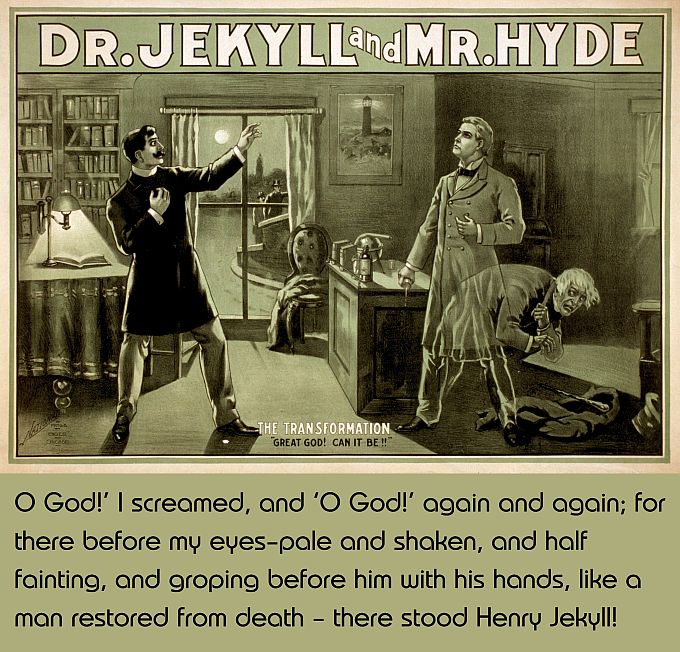
BELOW: “She had an evil face, smoothed by hypocrisy; but her manners were excellent.” Little is as it seems in this gothic Victorian classic.
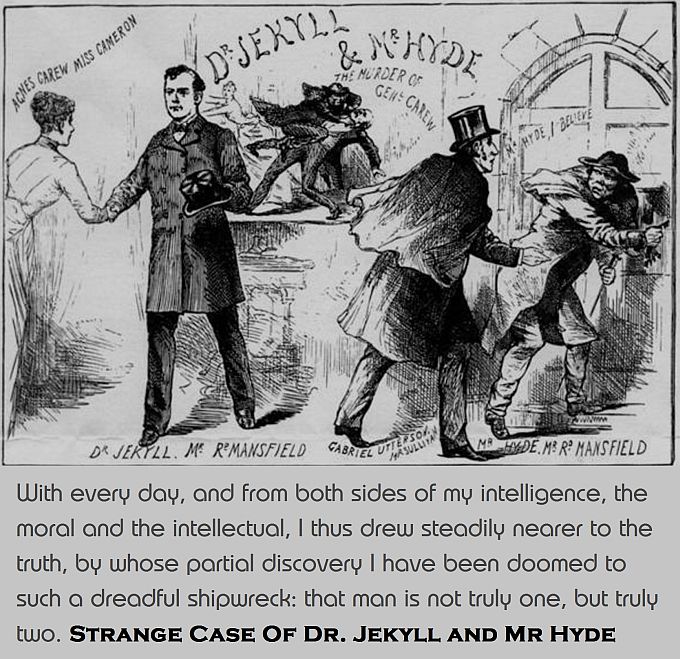
BELOW: In The Laboratory (c.1885–87) by Henry Alexander (1860–1894).
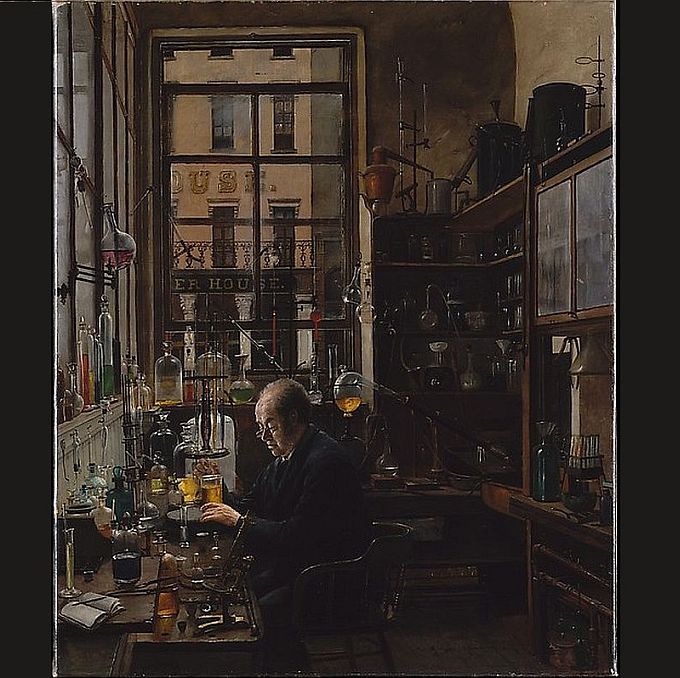
BELOW: Imagine if you could live two lives; one of hedonism & debauchery – another blameless & gentle.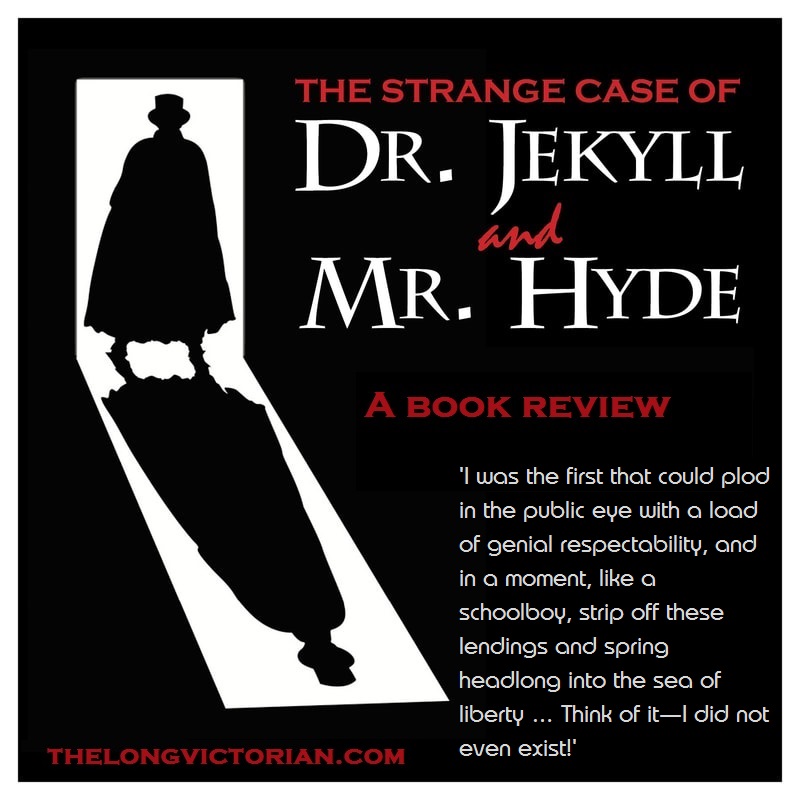
You give a fascinating interpretation of Stevenson’s thinking, and his motives in writing the novel(la).
The possible association of the book with the indecency laws isn’t one I’ve ever heard, but it is an interesting theory. The connection with ‘Deacon’ Brodie is the most commonly cited one and is expecially strong in Edinburgh circles.
LikeLiked by 1 person
Thank you! 🙂 I left a lot out, but a review can only be so long. I could have touched on Scottish identity, and said more about Christianity. Others have mentioned that I might have brought in the possible influence of Frankenstein, and also phrenology/physiognomy. No shortage of things to say – and so short a story.
LikeLiked by 1 person
I was lucky enough to come to Dr Jekyll and Mr Hyde “fresh” because I read it as a young teenager, knowing nothing about it whatsoever. I was immediately hooked and credit this book as one of the first to draw me into the classics, and especially to instill in me a lifelong love of the Victorian era. Something about polite society that makes humor and horror all the more interesting….
LikeLike
You hadn’t seen any movie versions before reading? Wonderful. Although I’ve enjoyed the film versions I think they are part of the reason the book is underestimated; people often think it is a pot-boiler with no serious ideas behind it.
LikeLiked by 1 person
I actually have still never seen any film adaptations. But I definitely was struck with how intellectual the text was.
LikeLiked by 1 person